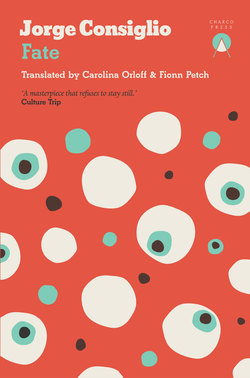Читать книгу Fate - Jorge Consiglio - Страница 15
На сайте Литреса книга снята с продажи.
ОглавлениеBlood does not have a price, read the German. He was waiting for his turn at a haemotherapy clinic. A friend of Marina Kezelman’s was seriously ill and needed blood donors. Karl was certainly fit, but it was his height that had made everyone – within his universe of acquaintances, within his herd – deem him the man for the job. The German has to donate blood, they all agreed. They mistook size for health. Now Karl was biting the nail of his middle finger in a room lined with tiles. The process went like this: nurse, bed, needle, vein. Enduring the commotion of the drainage, the plasma on the cannula, speed and stillness at the same time. A circuit in which the German played an essential role without feeling responsible for it. There was something endless about the fluid streaming out of his body. That emptying-out held a meaning for him. His body understood it. He had become a shifting cartography, a stampede that bore witness, more than anything else, to his status as a foreigner.
They removed the needle – it made a sucking sound – and, taking his time, he gradually shifted upright. He stayed there sitting on the bed, his legs hanging ten centimetres from the floor. Silent. His face slack with perturbation. He was staring at a fixed point, a crack in the wall, the mark left by a nail or pin. In that instant, this blemish represented stability for Karl. It expressed certitude, permanence. The rest of the world, ceaselessly shifting, with its incessant movement, was not to be trusted; it introduced values of mutability. Despite everything – his own unsteadiness and that of his surroundings – he was determined to make an effort: he tried to stand up. His legs gave way in the attempt and he collapsed, face first. He had fainted. As he went down, he took with him a metal table full of medical supplies. This caused as much noise as it did mess, and attracted the attention of the staff.
It took several people to lift him. The help was effective and he came round quickly. He was made to sit down in the waiting room. A nurse said to him: You’re not going anywhere. Faced with Karl’s silence, she asked: Do you understand what I’m saying?
After seven minutes, the German took a deep breath. He stood up and left the clinic without a word to anyone. He walked a few blocks with his mind blank, empty of images. The fresh air filled him with a sudden serenity and he felt clear-headed, free. Soon enough he arrived at a plaza. He headed down a path until he found a bench ringed by bushes. He sat in the same position, half-turned to the left, until a group of children took over the playground. At that moment, he felt certain that the past had expired. He thought about his son, about Marina Kezelman and about everything that the present revealed to him.
That same day, he organised things so he could return to the plaza with Simón. He sat on the same bench, though by now the sun was barely a gleam. Simón was a bit lost. He picked things off the ground, turning them over for a few seconds and then discarding them. Then he went over to the play equipment. He launched himself down the slide three times, but when another kid his age approached, he moved away and went looking for his father. He was bored, he said; he wanted to go home. The German straightened the collar of his shirt and briefly felt disheartened. He had brought a bag of sweets and a Frisbee. They played with the disc in the open space, a bit of rough grass next to the bandstand. The Frisbee came and went through the air. Simón threw it hard and upwards, creating a perfect ellipsis. As usual, though, his confidence got the better of him. He threw the disc forwards, straight towards Karl, whose good reflexes helped him dodge it just in time. It barely scraped his cheek. Five centimetres to the left and it would have got him straight in the eye.
